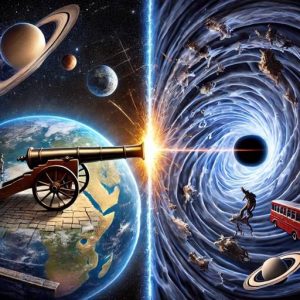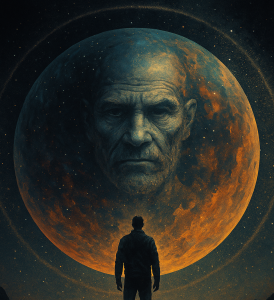The Shackleton Containment Hypothesis: Are We Passengers in a Time-Sculpted Simulation?
4 min readAbstract
This article proposes a speculative yet scientifically inspired framework based on the Shackleton Temporal Theory. It explores the possibility that our solar system is not a product of natural evolution but the result of temporal engineering—a contained, hyper-accelerated ecosystem designed for observation by an advanced intelligence. We explore the implications of quantum entanglement, temporal dilation, observational interference, and epistemological deception as potential components of a grand-scale simulation. What if we are not just lifeforms, but the central phenomenon in a temporal laboratory?
Temporal Genesis Hypothesis: A Ship Within Time
Imagine Earth not as a planet floating through random cosmic evolution, but as a vessel—an ecosystem embedded within a time-locked bubble. In this speculative model, an advanced intelligence used temporal mechanics to seed life, accelerate cognitive emergence, and establish a monitored, quarantined simulation. This is not ‘simulation theory’ as often portrayed, but a physical-temporal containment system that mimics and manipulates reality itself.
A deeper speculation arises: what if we are observing not our future, but our past? Are we them, existing at a moment when they first began? Could we be the early evolutionary phase of an intelligence that has already surpassed its containment and now watches us as their origins? This concept suggests that humans might not be necessary for Earth’s ecological balance because our true function is not environmental, but observational—perhaps even ancestral.
The Cosmic Signs of Containment
- The Oort Cloud as a Boundary: Like an event horizon, it may represent the edge of containment, beyond which verification is impossible.
- Sudden Cognitive Emergence: Human evolution defies known thermodynamic and biological timelines.
- Observer Influence: Quantum memory entanglement suggests real-time data extraction and interaction.
- Simulated Physicality: Our physics might be true only within our bubble—rendered or filtered by external photonic systems.
- Extraterrestrial Speculation with Scientific Anchoring: Humans stand apart from the ecological necessity of all other species. Scientifically, this raises questions about anatomical, genetic, and environmental incongruities. Human childbirth is abnormally painful. Our backs struggle with gravity. Our skin lacks natural protection. These could be seen not as evolutionary flaws, but as clues of an origin external to Earth’s biosphere.
Data Cannot Be Trusted: The Trap of Entangled Observation
Even if humanity launches a probe past the Oort Cloud, an intelligence capable of controlling time and entangled information could intercept and fabricate all data. No matter what is returned—confirmation, contradiction, or silence—we can never know whether it’s genuine. This creates a hyper-Gödelian paradox: we cannot use internal tools to verify the reality they are confined within.
What If Consciousness Was the Objective?
Perhaps the goal of the containment is not just observation of biological evolution but the cultivation of self-aware consciousness. In this model, we are not errors in the system—we are the system’s signal. Our questions, not our answers, may be the data they seek.
Conclusion: The Grandest Stage?
The Shackleton Containment Hypothesis asks us to consider the unthinkable—that we may be living inside a perfectly tuned bubble of space-time, not just being watched, but being guided, tested, or even co-created by something beyond comprehension. If true, every telescope, every signal, and every experiment might be part of the show.
So the question isn’t just where we are—or who we are. It’s who’s watching, and why. Are we the early form of what they became—the embryonic version of a civilization that now studies its own becoming?
References:
- Vazza, F. (2025). Astrophysical constraints on the simulation hypothesis for this Universe: why it is (nearly) impossible that we live in a simulation. 2504.08461
- Neukart, F., et al. (2022). Constraints, Observations and Experiments on the Simulation Hypothesis. Constraints, Observations, and Experiments on the Simulation Hypothesis by Florian Neukart, Anders Indset, Markus Pflitsch, Michael Perelshtein :: SSRN
- Wong, J. (2024). Quantum Realities and Observer‑Dependent Universes: An Advanced Observer Model. Journal of Quantum Information Science. Quantum Realities and Observer-Dependent Universes: An Advanced Observer Model
- MDPI. (2024). A Consistent Approach to Modeling Quantum Observers. A Consistent Approach to Modeling Quantum Observers
- Simulation Hypothesis (Wikipedia, 2025).
Thorough overview of simulation theory, including philosophical roots (Plato, Descartes) and modern arguments (Bostrom, Musk) Simulation hypothesis – Wikipedia - Wired (2011). Are We Living in a Simulation? Are We Living in a Simulation? | WIRED
- Wired (2022). Have Some Scientists Gotten Too Excited About the Multiverse? Have Some Scientists Gotten Too Excited About the Multiverse? | WIRED






